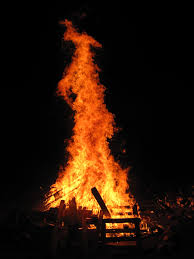
记忆方法
将“bonfire”拆解为“boon”和“fire”。想象“boon”是一个朋友,在“fire”(火)旁给你带来好处(boon),因此形成了“bonfire”,即篝火,一种带来快乐的聚会活动。
以上内容由AI生成, 仅供参考和借鉴
中文词源
bonfire 篝火
来自bone, 骨头。fire, 火。古义指焚烧动物尸骨作为一种宗教仪式。后指篝火,bone刻意脱落字母e变成词根bon , 好,漂亮。
英语词源
- bonfire
-
bonfire: [14] A bonfire was originally a fire in which bones were burned. References to such (presumably rather evil-smelling) fires, which were large open air affairs, continue down to the 18th century, but latterly they have a distinctly antiquarian air, as if such things were a thing of the past. By the later 15th century the word was already passing to the more general modern meaning ‘large outdoor fire’, either celebratory (as in Bonfire Night, 5 November) or for destroying refuse.
=> bone - bonfire (n.)
- 1550s, from Middle English banefire (late 15c.), originally a fire in which bones were burned. See bone (n.) + fire (n.).
权威例句
- 1. The bonfire was still smouldering the next day.
- 到了第二天,篝火还在闷燃。
- 2. They piled wood onto the bonfire until the flames roared.
- 他们不断往篝火上加木柴,直到火光冲天.
- 3. A downpour of rain put out the children's bonfire.
- 一阵大雨把孩子们的营火都浇灭了.
- 4. The bonfire lightened the sky.
- 营火照亮了天空.
- 5. With the help of his gun and a bonfire, the hunter fought off two hungry tigers.
- 借助一把猎枪和一堆篝火, 猎人赶跑了两只饥饿的老虎.